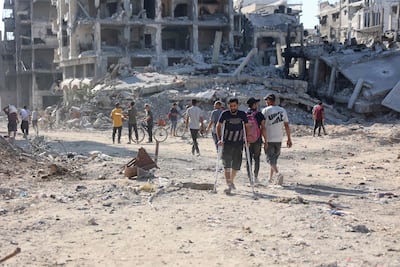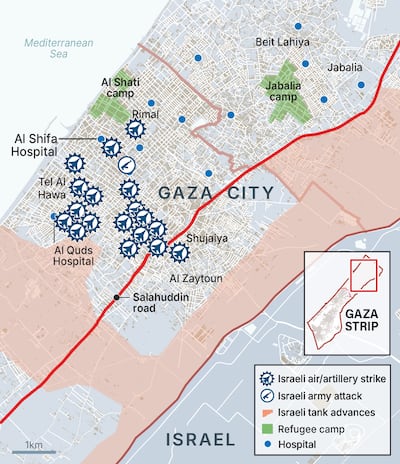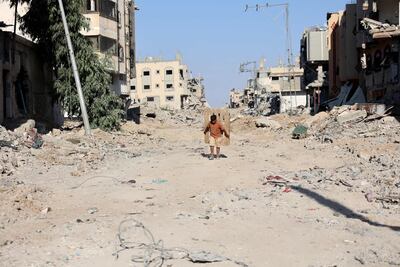Live updates: Follow the latest news on Israel-Gaza
Gaza city's neighbourhood of Shujaiya has been left in ruins after Israeli forces withdrew, with bodies of civilians strewn across the streets, witnesses and civil authorities told The National.
Israeli forces launched renewed operations in and around Gaza city in recent weeks, despite having claimed the area was cleared of Hamas militants in its military offensive early in the war.
Gaza authorities said Israeli forces had withdrawn from the city's eastern Shujaiya neighbourhood on Thursday but left destruction in their wake.
"The entire area has now become a ghost town, uninhabitable for life," said Mahmoud Basal, spokesman for Gaza's civil defence.
He told The National at least 20 bodies had been recovered from the rubble in the past 24 hours.
The Palestinian Wafa news agency reported that at least 60 bodies had been recovered from Shujaiya in total and that dozens more remain under the rubble.

Civilians said many of the bodies scattered around the area appeared to have been dug up of the nearby cemetery.
Ragheb Hassanain, 28, a resident of the area, said the streets are filled with horrific scenes of bodies and human remains.
"The army dug up a newly established cemetery in the middle of the neighbourhood and several other graves in different areas, that's why there are so many dead bodies,” he told The National.
He found three of his neighbours' bodies. They had been buried in the cemetery and removed from their graves.
“When we went to check their burial site, it was just a deep hole with no trace of bones or bodies. After searching the area, we found decayed bodies and bones about 200 metres from the cemetery."
Mr Hassanain said he initially thought the bodies in the area belonged to those killed in the recent military operation but then realised they had been dug up from the cemetery.
"There was a horrible smell," he said. "While there were indeed bodies in the streets, most weren't yet decayed. It was coming from the bodies in the cemeteries that were dug up."
People in the graveyard were now marking the resting place of their loved ones with colours to identify them, he said.

Mohammed Jundiya spoke to The National as he looked for the body of his son Suhaib, who was killed four months ago. He was asking people if they had seen a body of a young boy wearing a black shirt and jeans.
"I don't want anything from this world, I just want to rebury my son," he said.
Mr Basal said the civil defence was now struggling to count the number of dead because the closest hospital, Al Ahli Arab, is out of service.
“There are many missing bodies of people who stayed in their homes and were present in the neighbourhood during the incursion and searches are ongoing, but resources are severely lacking," Mr Basal said.
He said the Israeli army had bulldozed a large cemetery, with old and new graves, in the middle of Baghdad Street in Shujaiya, using the graves and bodies as cover for its tanks and armoured vehicles.
Identifying the exhumed bodies is extremely difficult because they are decomposed and reduced to bones, he said.
Israel's military did not issue a statement about the destruction of the graveyard.
A recent CNN investigation found Israeli forces had desecrated at least 16 cemeteries since the outbreak of the war in October.
An Israeli military representative did not confirm its role in the destruction of the 16 graveyards but told CNN it sometimes has "no other choice" but to target cemeteries which it accuses Hamas of using for military purposes.
The military is also searching for the remains of Israeli hostages taken by Hamas on October 7.

In a statement confirming its withdrawal from Shujaiya, the army said it had destroyed eight tunnels operated by militants in the area.
Weapons, laptops and communication equipment were found inside the tunnels, the military said.
On Tuesday, the army said it had killed at least 150 "terrorists" during operations in Shujaiya.
Gazans civilians returning to Shujaiya said the area now lies in ruins.
Ahmed Al Batniji, 38, from Shujaiya, was running back to the neighbourhood only to find his home in ruins and piles of rubble following the withdrawal of troops.
"I started running without thinking about my brother and nephew who I lost contact with," Mr Al Batniji said.
“We don't know if my brother and his son are under the rubble, or in another place, arrested by the army. I tried asking everyone who stayed in the area and those who were trapped, but there is still no news," he said.
Mr Al Batniji left the neighbourhood on the first day of the incursion of Israeli forces with five members of his family and his brother.
“Many people went missing in Shujaiya and their families are trying to search for them," he said. "Everything happened so suddenly, the bombing was intense and random, and people went missing in the past two days when they returned to check on their homes.
Hassan Jundiya, 67, who lives in Shujaiya, described his connection to the area.
“We love Shujaiya and it loves us deeply," he told The National. "Everything in Shujaiya is beautiful and it represents us, even in its destruction.
“Israel's destruction of Shujaiya in 2014 wasn't enough and in this war, they couldn't restrain themselves again. They came for the third time to destroy our homeland where we were raised."
Mr Jundiya said Shujaiya is his home and he will spend his last days there.
“We will rebuild Shujaiya again," he said.

